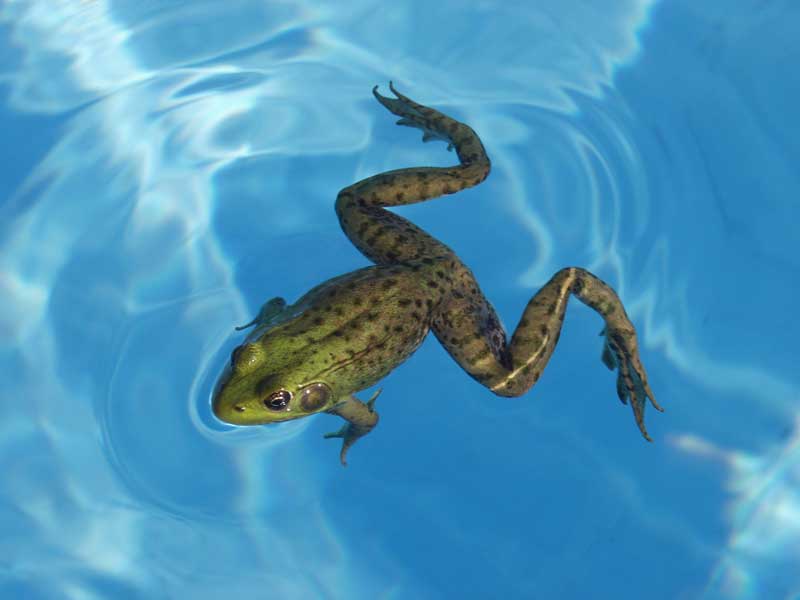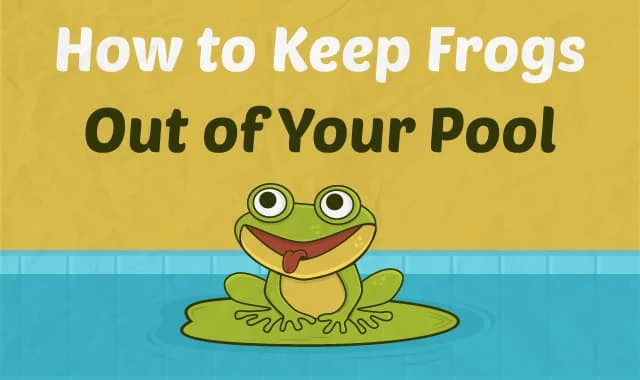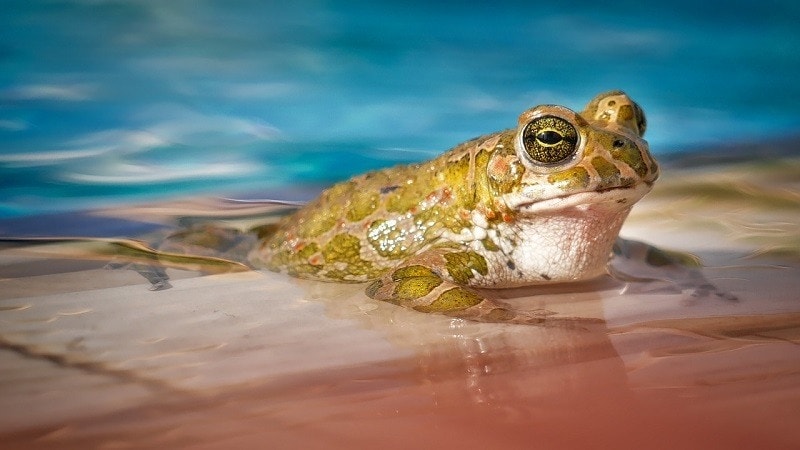How to Keep Frogs Out of Your Pool
Do you hear annoying rattles in your backyard at night? Have you ever found a dead frog or toad in your backyard swimming pool? Do you want them to go away and stop bothering you? As far as frogs go, that’s not your backyard pool. It’s a big pond where they hang out, eat bugs, and do all the frog business. To prevent it, take the time to learn how to keep frogs out of your pool.
Why Do You Have Frogs in Your Pool?
First, frogs can’t tell the difference between chlorinated water and clean water. Still, there are various reasons why you might find frogs in a swimming pool. One of the most common reasons is that they will enter your pool looking for food.
There is a catalog of insects that are already attracted to the water, often featuring pool lights that only increase the number of insects trapped in the water. It is these rich foods that lure frogs into an adventure.
Why are Frogs in Pool a Problem?

Frogs may help control insects and other pests in the garden, but you don’t want them in the pool for health reasons. Frogs carry a variety of bacteria and other diseases that could harm your family if they multiply in pool water. Normally, the chlorine in the pool will kill these contaminants, but if your chlorine levels are low and frogs get into the pool, there can be real health problems.
The main problem with frogs and toads is that they will breed and lay eggs in your pool. If this happens, you will see cloudy eggs floating on the water. Net them out, or let the skimmer take care of the problem, they end up in the filter.
If you let frogs into your pool, you will inevitably leave some dead and rotting frogs in the water – which is not good for swimming!
- They carry bacteria and disease
Frogs are wild animals that carry harmful pollutants that may not harm them but could make you and your family sick. Foremost among them is Salmonella, which is the cause of disease outbreaks across the country.
While your sanitizer does a good job of killing germs that frogs might spread, it’s best to keep those germs out of your pool in the first place. If frogs happen to show up when your pool chemistry isn’t perfectly balanced, you may have a polluted and unusable pool on your hands.
- They lay eggs in water
Like most short-lived creatures, frogs reproduce and lay eggs frequently to expand their species as much as possible. So, if they’re hanging out in your backyard pool, chances are they’re laying eggs in your pool.
Frogs lay one to three eggs a year, and sometimes more. When they do, there will be a lot of eggs. Depending on the frog species, these slippery creatures can lay up to 50,000 eggs at a time. Good news for them, bad news for your pool.
Frog eggs must be laid in water to survive biologically, so unless you have a nice frog pond in your backyard where you can encourage frogs to move there, there’s a good chance they’ll end up in your pond.
If you happen to find a sticky mass of frog eggs floating in the pond, your best bet is to scoop it out with your skimmer and put it in fresh water. It would be ideal if you have a pond or lake nearby, otherwise, you can place them in another container away from your pond.
- Their presence promotes the growth of algae
Frog eggs found in your swimming pool are not only a very disgusting thing but also have a very nasty side effect (except for an army of hatched frogs). It turns out that when the tadpoles emerge from their eggs, they actually churn in the water, causing residues to form on the surface.
Despite the perfectly balanced chemicals in your pool, the unfortunate consequences of this residue are blocking sunlight and promoting algae growth. While this is a great boost to their natural ecosystem (i.e. ponds), it’s probably the last thing you want to do in a pool.
- They will eventually die
A major disadvantage of having any permanently settled wildlife in your yard is the inevitable consequence of death: death. If your pond is full of frogs and their young, one day you will walk out of the pond and find some dead frogs lying around.
Strategies for Keeping Frogs Out of Your Pool

If you have been having issues with finding frogs in your pool, you’re in luck. There are a lot of ways that you can prevent frogs from getting into your pool.
Use a pool cover
Pool covers are a great way to keep your pool clean and well maintained. They keep leaves, grass, dirt, and other debris out of your pool, and stop chlorine-destroying UV rays from wiping your chlorine away. They have the added benefit of preventing frog invasions.
Using a pool cover at night also prevents insects from entering the water, further encouraging frogs to forage elsewhere. Either a solar cover or a safety cover can do this, however, a safety cover can give you a little extra peace of mind knowing that no frogs could accidentally get caught under the cover.
Turn off the pool lights at night
In addition to saving power when you’re not enjoying the lights outdoors, you can turn off the pool lights and feed all kinds of bugs that are attracted to the lights at night in a dingy backyard.
Frogs won’t jump into your backyard or pool without a thick meal they eat around a cozy pool.
Use frog logs
The Frog Log is a cute little device that you can attach to the side of your pool to help poor, stuck frogs jump out of your pool if they accidentally fall over. It’s actually a floating pad attached to a slope, much like an inorganic water lily pad with a bridge.
If a frog, mouse, or other animal happens to fall into your pool, here’s a clever little helper to let them escape again, unscathed. Not only are frog logs a very cheap option to keep critters out of your pool, but they have the added benefit of saving you from having to fish dead frogs out of your pool in the morning.
Keep the water flowing
By definition, circulating water is not static. Keeping your pool pump running will help avoid stagnant water problems, which can attract mosquitoes, small bugs, and other insects to your pool as an appetizer for frogs.
Even better, installing a water feature, such as a fountain, waterfall, or aerator, and running it at night, will allow the bugs to find another waterside frequented. When you take away the frog’s food, the frog will most likely leave as well.
Build or install swimming pool fencing
If you have kids or pets at home, installing a pool fence is a good idea. These are extra protections for pool safety, keeping your kids and pets safe, even if they happen to be out unsupervised.
Pool fencing is also a great way to keep frogs and other unwanted wildlife out of the pool area. The fence must be sturdy to keep smaller animals out, as frogs will jump straight over iron poles or links. In this case, you’re better off choosing solid wood or vinyl fencing. Just make sure there are no gaps and the fence surrounds the entire perimeter of the pool.
Try mild deterrence
There are many home remedies that may help gently encourage frogs to jump out of your pool. These won’t cost much and may actually have some side effects on your yard or garden.
Coffee grounds: Sprinkling used coffee grounds on the edge of your pool is a great way to signal the frogs to go to another place to refrigerate. Coffee is very irritating to frogs’ skin, so they must avoid swimming pools if they are surrounded by a coffee force field. The nitrates in coffee are also good for the soil if you work in the garden.
Vinegar: Vinegar is also very uncomfortable to frogs’ skin and can irritate them like coffee. If you see a place with lots of frogs, spray it with a spray bottle every night and warn the frogs to stay away
Citric acid: Or lemon juice and water will do. Do not actually spray frogs with this mixture as it will kill them. Regularly spraying around the pond or in areas where frogs congregate near the pond is a good (natural) way to prevent hostile frog invasions.
Keep the lawn tidy
Maintaining a well-trimmed lawn is a very useful way to keep frogs out of your yard. If there are no weeds, tall grass, or other leaf debris to hide in, frogs won’t find your yard the right habitat for their needs.
Wrong Ways to Keeping Frogs Out of Your Pool
While there are plenty of great ways to keep frogs from swimming in your pool, there are some that should be avoided.
Use pesticides
Using pesticides in your yard may end up being useless. Not only do pesticides fail to deter frogs, but they can cause damage to plants.
Try to avoid harsh chemicals to deter frogs. A variety of more environmentally friendly substances can be used.
Scarecrow
Some have tried to scare away frogs with items like rubber snakes and fake birds, like scarecrows. While this method is harmless, it is also quite ineffective.
While frogs have a hard time distinguishing between ponds and ponds, they are more likely to distinguish between living things and fake ones. If the frogs sense that they are not in real danger, they will not be prevented from entering your pool.
Inhumane method
While frogs may not be your cup of tea, it is strongly recommended that you avoid inhumane treatment of frogs.
Certain species of frogs and toads are endangered and may be protected by your country. Killing endangered frogs could lead to their extinction and could even get you into legal trouble.
Even if the frogs are not endangered, they are purely intentional and not meant to cause the problems you might experience. It’s better to find an alternative way to remove and prevent frogs. There are many useful and humane methods.
Final Thoughts
Now that you know how to keep frogs out of your pond, it’s important to remember that no matter what or how many steps you take, it’s always possible for a little one to find his way into the water. This is why using multiple tactics is more effective than relying on just one.
By the way, frogs are neither dangerous nor poisonous, nor will they harm you if you touch them. So, if you see a person swimming in your pool before it drowns, gently scoop it up with a skimmer and place it a long way from your pool or the pond you built the place. You will feel better, and the frog will certainly feel better.
